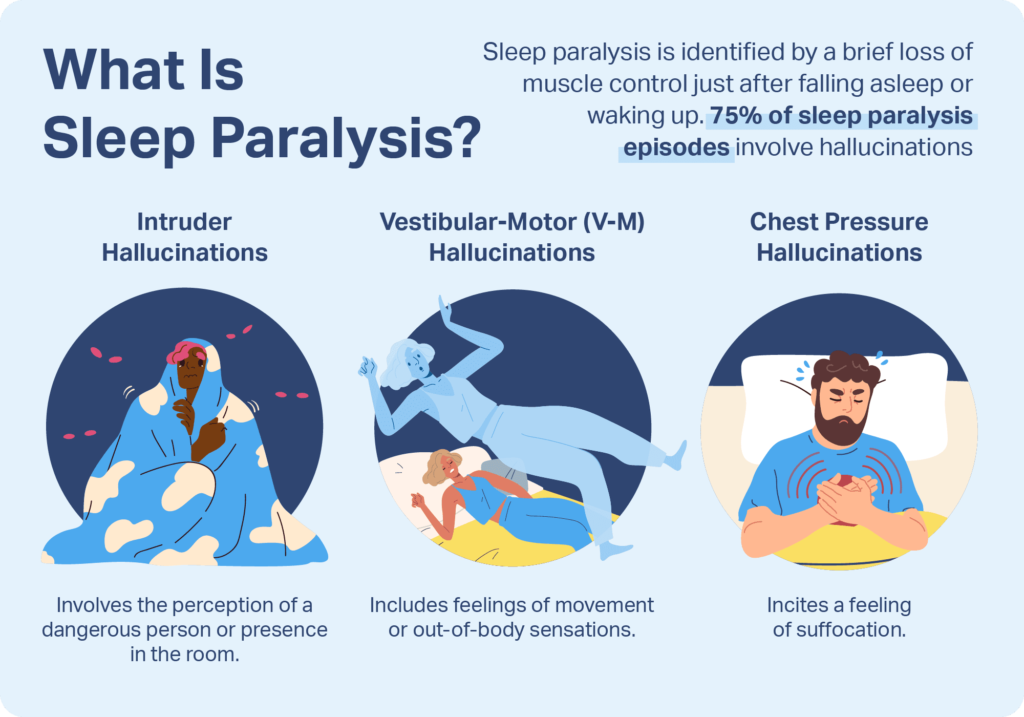
The connection between sleep paralysis and PTSD
- jasminessteiner
- Mar 23, 2023
- 7 min read
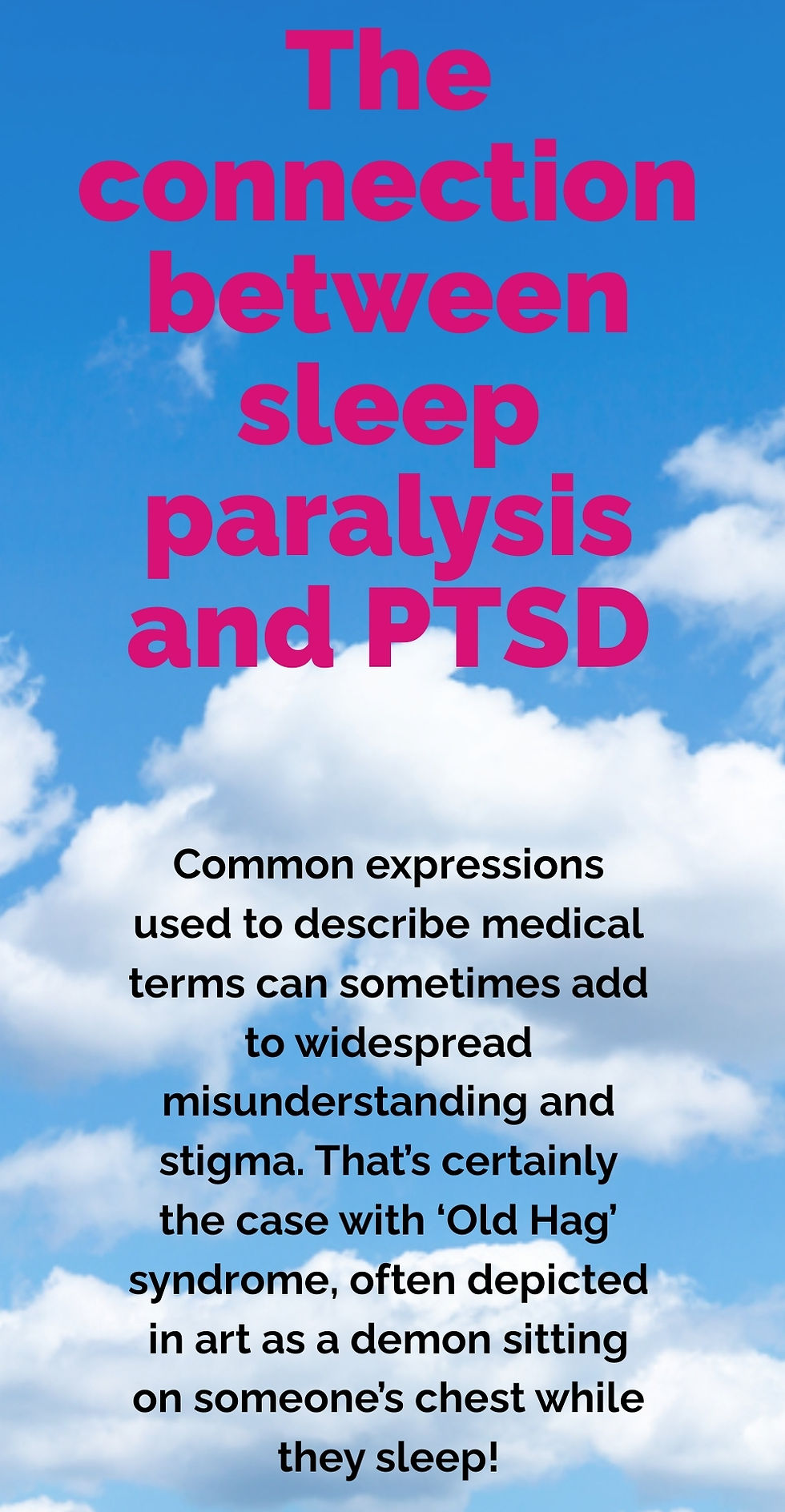
I have personally battled with sleep paralysis, pretty intensly now , since dec 2020 when i had seizures and came back ( woke up a week later in ICU ), and I can honestly say that it IS getting more intense . Last night's episode was one of the worst I have experienced, and yes , it's like an actual demon sitting on my chest holding me down .
It's like I can feel the presence, but it's not visible (sometimes, other times it is. ) and while I am half awake but literally stuck in dream world , I usually am coherent enough to be able to say in my mind "in the name of God, leave me now" or I say my hail Mary's, (I hold on to my grandma's rosary 📿 in bed due to this happening alot) .
I had a friend I hung out with, who also had it very bad , and I almost feel as if his "shadow people" that held him down while he slept , somehow connected to me and my dreams... but I know, that's "crazy" right 🙄🤨 so we won't go there.

yes, this is EXACTLY what happens to me personally. I am not alone while this happens, these figures are what hold me down.
I do however , want to dive deep into this subject as I try to work through this chaos , as it IS affecting me at night extremely bad . I already have the hardest tine sleeping, it takes me hours , and then like last night , when I finally do fall asleep I'm stuck I'm some nightmare demon land of paralysis, trying to scream for anyone to help me for what feels like centuries !!
It. Is. Very. Scary. To. Me. And. I. Don't. Like. It. If you experience this, let me know what helps you please, also feel free to start any forums regarding ANY subjects pertaining to CPTSD here in the forum section, let's CONNECT. I need friends who have the same issues, i need people who understand me and I can't find that here within my family. I am the outcast. Just like my dad was . I would love to connect , just leave me a comment or start your own forum and share anything you like here in the blog itself .
Let's get to it then---
The connection between sleep paralysis and PTSD:
Common expressions used to describe medical terms can sometimes add to widespread misunderstanding and stigma. That’s certainly the case with ‘Old Hag’ syndrome, often depicted in art as a demon sitting on someone’s chest while they sleep!
This is, in fact, a relatively common condition called sleep paralysis. It can affect a broad range of people, including those with post-traumatic stress disorder.Insomnia and night-time restlessness associated with PTSD are well known. Around 70-90% of people with a PTSD diagnosis have some form of sleep disturbance. Most commonly nightmares. Some of these individuals may be unaware that what they are experiencing is a form of sleep paralysis.
This article answers the question “What is sleep paralysis?” and explores its close connection to your physical, mental and emotional wellbeing, and your recovery from PTSD .
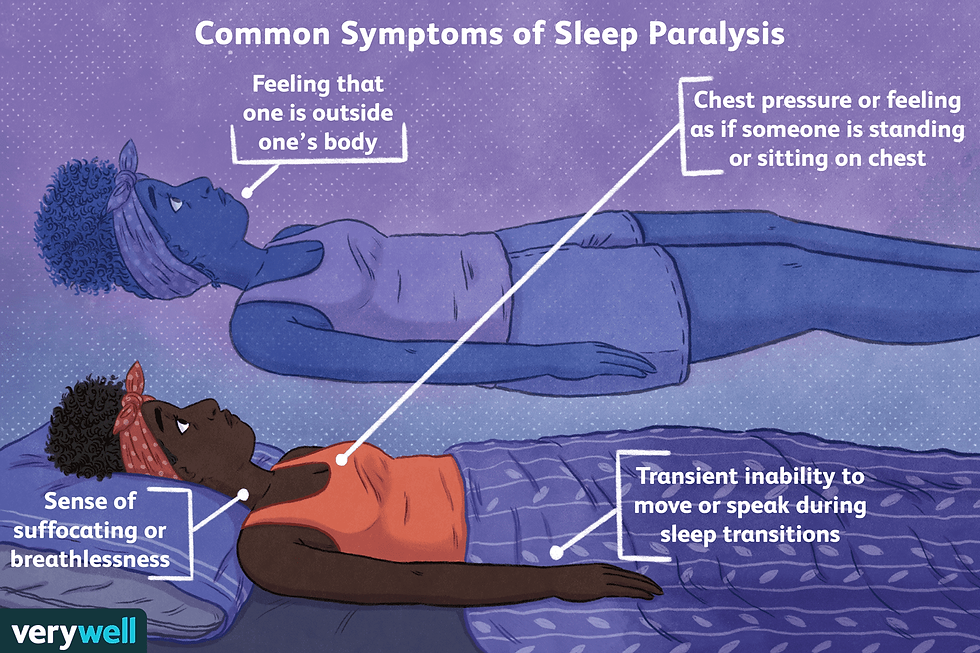
How common is sleep paralysis?
It’s believed that around 30% of the population experience an episode of sleep paralysis at least once. As mentioned in the introduction, in ancient times it was associated with witchcraft and demons in many global cultures. (This is why sleep paralysis is called Old Hag syndrome in the UK.)As research into this issue advances, it’s becoming clear that people with PTSD are far more likely to experience sleep paralysis than people without PTSD.
What does sleep paralysis involve?
Like many other sleep-related symptoms of PTSD, this is a disruption in your Circadian rhythm.
Every 24 hours, humans pass through a cycle of physical, mental, and behavioural activities that maintain their health, including their immune response and mental wellbeing. This cycle should include at least seven hours of sleep, including periods of REM (rapid eye movement) sleep, which are especially important to your health.During REM sleep, neurotransmitters (your brain’s messengers) signal parts of your musculoskeletal system to stay immobile for a while .
As we’ve mentioned before, the physical changes that occur as a result of trauma and PTSD include alterationsto your brain and hormonal balance .

The fact you are on constant alert, can make it difficult to go to sleep, or stay asleep.This disruption can also cause your muscles to be out of step with the rest of your sleep-wake cycle. Though you become partially conscious, your limbs are still in rest mode, and unresponsive when you try to move. It can affect your neck and face too, making it temporarily impossible to speak or open your mouth to breathe fully.Though sleep paralysis is not a serious medical problem – and can quickly pass – it is disorientating, unpleasant and at times terrifying. Particularly if you’re still experiencing residual dreams and nightmares as you become awake. (This is what I personally experience, very intense , more often then not - jazzy)
In this situation, not only do you have an inability to move as you wake, but you can also be hallucinating too.
PTSD, hallucinations and sleep paralysis
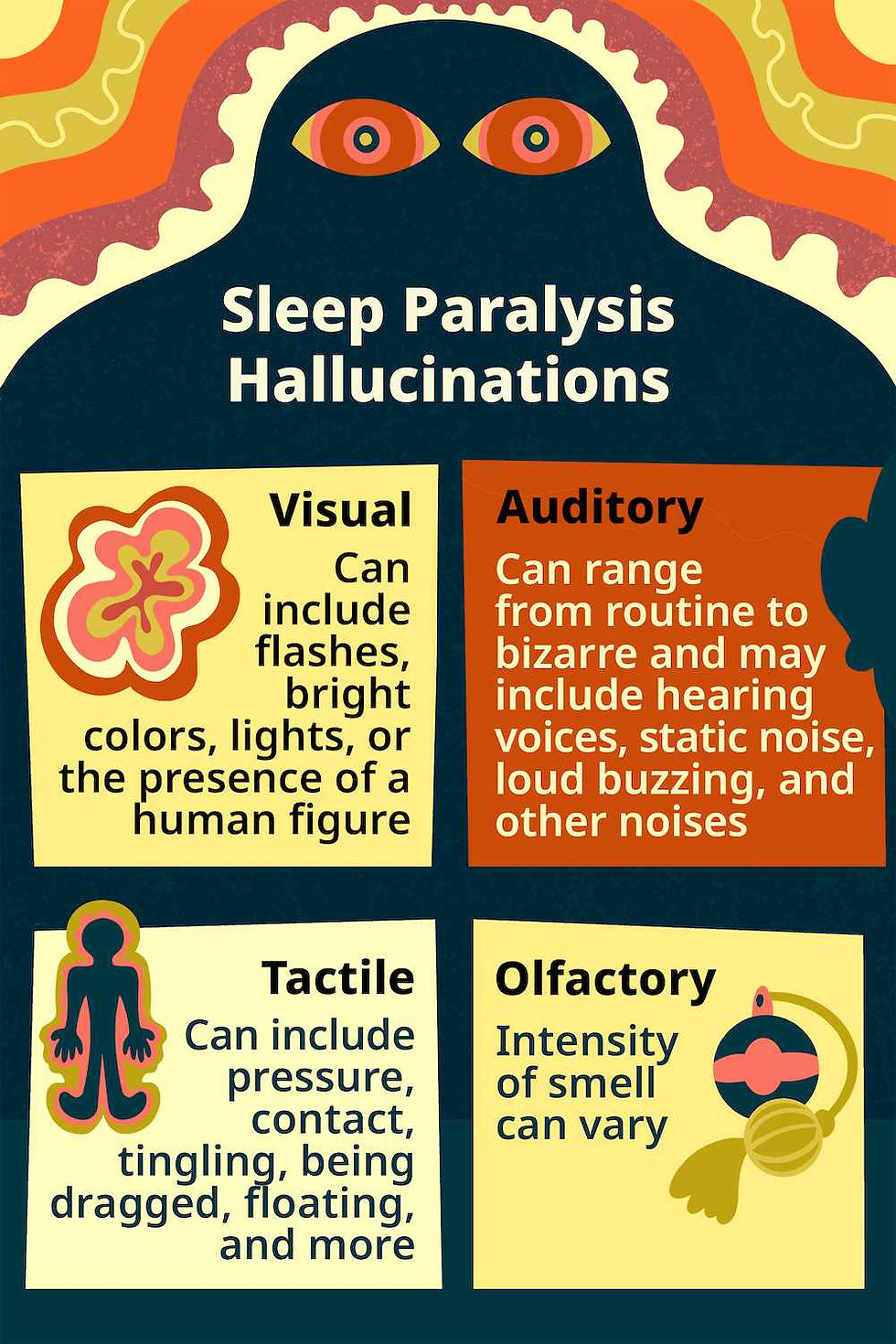
For some people with PTSD, sleep paralysis is not only a symptom but also a trigger for additional anxiety and general mental ill-health. That’s because temporary immobility from sleep paralysis can blur the boundaries between reality and nightmares.When you’re falling asleep, your brain is processing information and can generate hypnogogic hallucinations, or visions. As you awake, these are called hypnopompic hallucinations.The sensory impact of sleep paralysis could even be sounds or smells, or physical sensations such as feeling like something is pressing you down, or that you are being watched or touched.All of this adds to the way this sleep-related PTSD symptom can be severely distressing.
For example, if you have experienced sexual or physical abuse it is essential to feel in control of your own body and safe in your home. This can be seriously eroded by the sensations, immobility and hallucinations resulting from sleep paralysis.
Also, it’s believed that the time of day a traumatic experience occurs can alter the physiological and psychological response, and the person’s ability to maintain a healthy Circadian rhythm.
For instance, if your trauma is associated with evening or night, then your state of alertness will increase just as your internal clock should be setting your rest mode. (Ahh, makes sense.)
Sleep paralysis and other problems with your circadian rhythm erode your body’s ability to carry out essential healing, repair and restoration tasks, storing up various physical health issues.
Sleep paralysis treatment
There are ways to treat sleep paralysis and other forms of sleep disturbance as a symptom of PTSD. For example: “Cognitive-behavioural sleep management constitutes a widely acknowledge, acceptable and durably effective treatment option in PTSD”, according to one study.There are also medications for sleep disorders associated with PTSD, which can help some people restore a healthy Circadian rhythm . (In my case. I had life ending seizures in Dec 2020, and I stopped ALL medications after that that I was on, which included lorazepam for my sleep, which DID help me actually sleep. I personally haven't slept good for maybe 8 years now.- jazzy)
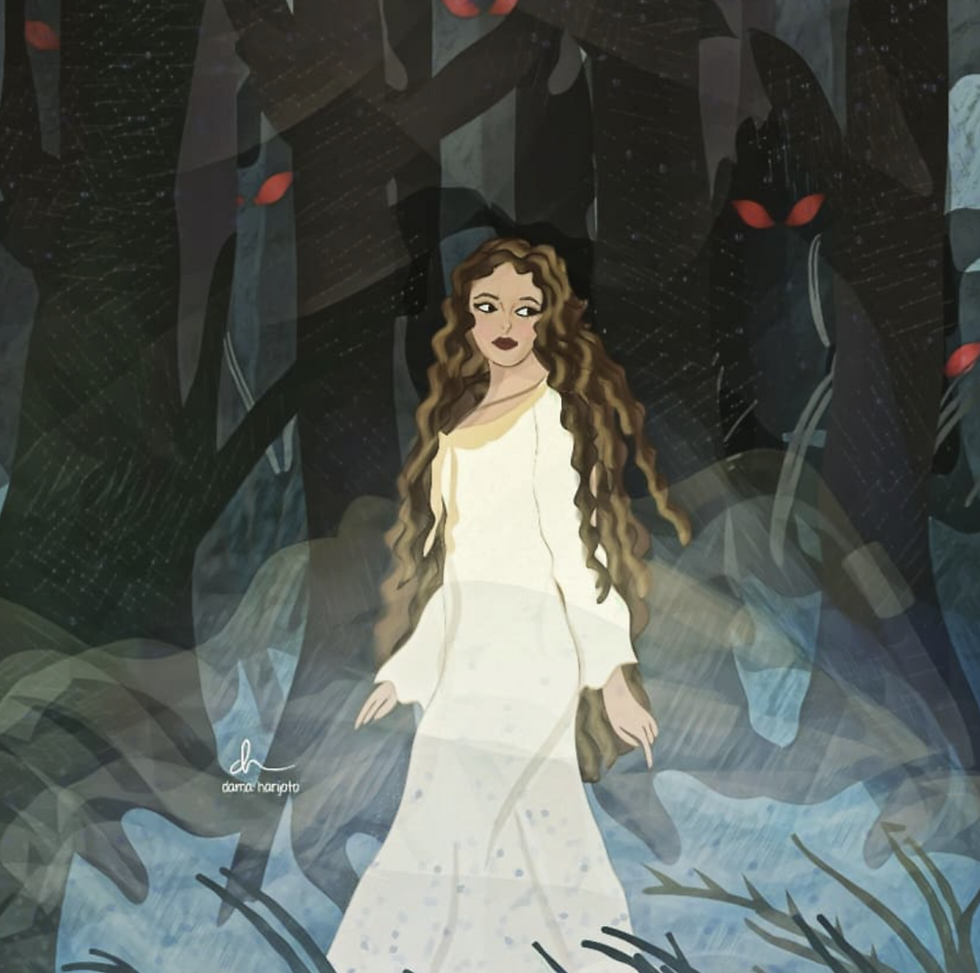
As disrupted and spasmodic sleep patterns increase the likelihood of episodes of sleep paralysis, it is important to take steps to improve your ability to rest properly each night. Including sticking to a night-time routine, avoiding alcohol, caffeine and rich food in the evening, and using your favourite calming techniques (ideally not your phone) to support improved slumber.For more information on CBT and other PTSD treatments and therapies, effective calming techniques, If you’re struggling with sleep paralysis, or other sleep disorders as a result of PTSD, please speak to your GP, or private practitioners are also available in the US and here on Hawaii Island .
☆☆☆ ORIGINAL ARTICLE FROM ptsduk.com https://www.ptsduk.org/the-connection-between-sleep-paralysis-and-ptsd/ ☆☆
I found another article here , which explains alot of the same as we just read, but it also has tips and tricks for dealing with your sleep paralysis:
What you can do:
You cannot stop sleep paralysis. All you can
do is manage your fear well.
Tell yourself that you are experiencing sleep
paralysis, that it is a sleep disorder, that it is
accompanied by fear and therefore it is
normal that your body is experiencing fear
and that this experience will end in a few
minutes.
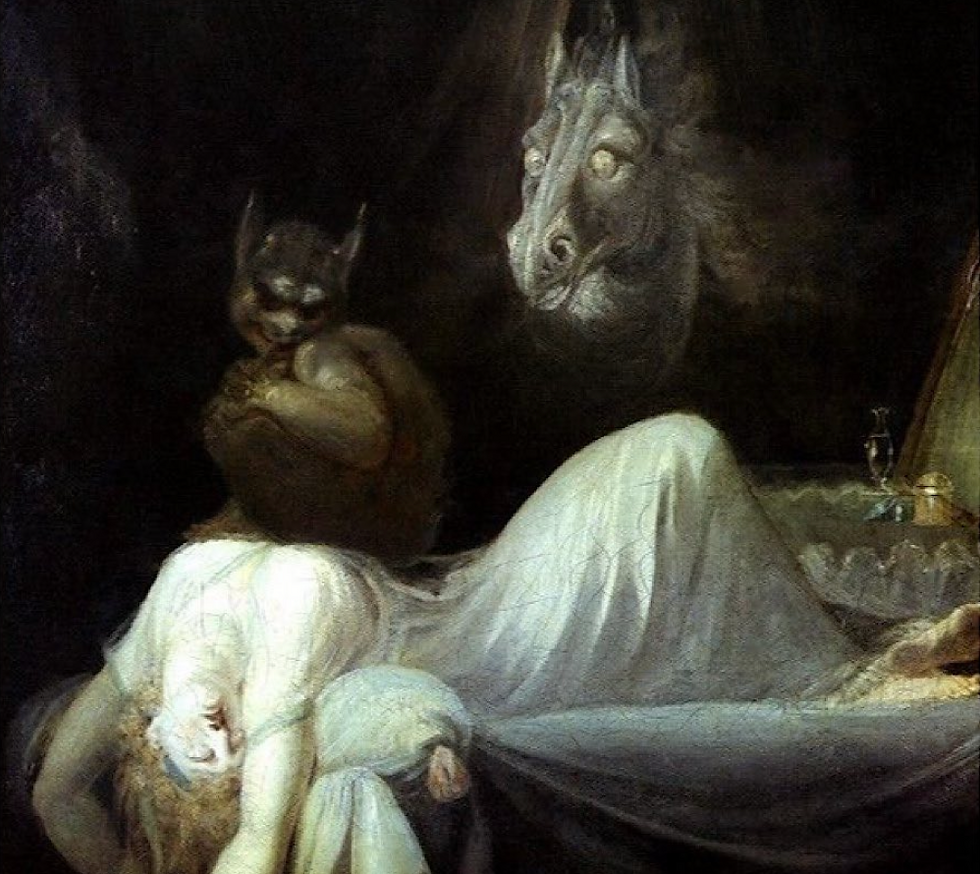
Don't try to move, that will make things
worse. Usually sleep paralysis lifts in fingers
and toes first, so if you want to try to move
something, start there (gahhhh I ALWAYS try to move lol)
Try to get oriented. Usually the eyes can
move and you can look at part of your room
and tell yourself where you are.
Remind yourself of the day and year.
It might help to have an anchor near your
bed.
The brain does function, even if you are
experiencing hallucinations
If you see or hear things that cannot be real,
tell yourself that you are having a
hallucination and that this is not real.
Find reasons why it can't be real
Try to listen to your thoughts instead of
paying attention to the hallucination
Distract yourself in your mind, maybe using
some of these exercises.
You can contain the hallucination using
imagery. Pretend that the noise is coming
from a radio or TV. Do this especially if it is a
hallucination of abusers. They are just a
projection in that box or on a screen, they are
not real.
You will still experience fear, that is in the
physiological nature of the experience, but
hopefully it won't be fear of death.
After experiencing sleep paralysis
Sleep paralysis that is paired with
hallucinations of abusers and flashbacks is
one of the worst re-experiencing situations
that ever happened to us. It is normal to have
a bad day and feel vulnerable.
Invest in self-
Self care and don't be too hard on yourself. Avoid more triggers and stress.
Do something relaxing.
Make yourself laugh.
You need to pay extra attention to staying oriented and grounded because you might tend to dissociate more
Prevention
Sleep paralysis is very difficult to deal with
when it is happening. It is better to find ways
to prevent it.
Pay a lot of attention to sleep hygiene and
developing rhythm in your life. It might help
to get the chaotic sleep pattern back into
order.
Some antidepressants (like SSRIs) influence
sleep phases. Ask your doctor about
something that limits REM sleep. (For me as I said, this isn't a option as I stopped my meds, but now i may want to ask my dr next visit about this after reading this . I hope this article helps someone else as well) It will also reduce your risk for sleep paralysis.
Relax before going to bed. Make it part of your evening ritual.
Sleep paralysis is
connected to the hypervigilant state of the
brain. Reducing the chronic stress will reduce the likelihood of experiencing sleep paralysis.
(But how does one do this , really? ! - jazzy)
☆☆☆ This was a GREAT article, check it out here - and leave a comment for the writer. Tekl them jazzy sent you! https://www.dis-sos.com/sleep-paralysis-in-ptsd/ )
☆☆☆Another great article, with some sleep paralysis artwork, Two of which are used above https://indie88.com/these-dark-drawings-reveal-the-horror-of-sleep-paralysis/
Treat yourself great today , love yourself extra please, I LOVE YOU, THE WORLD IS BETTER WITH YOU IN IT
XOX JAZZY




Comments